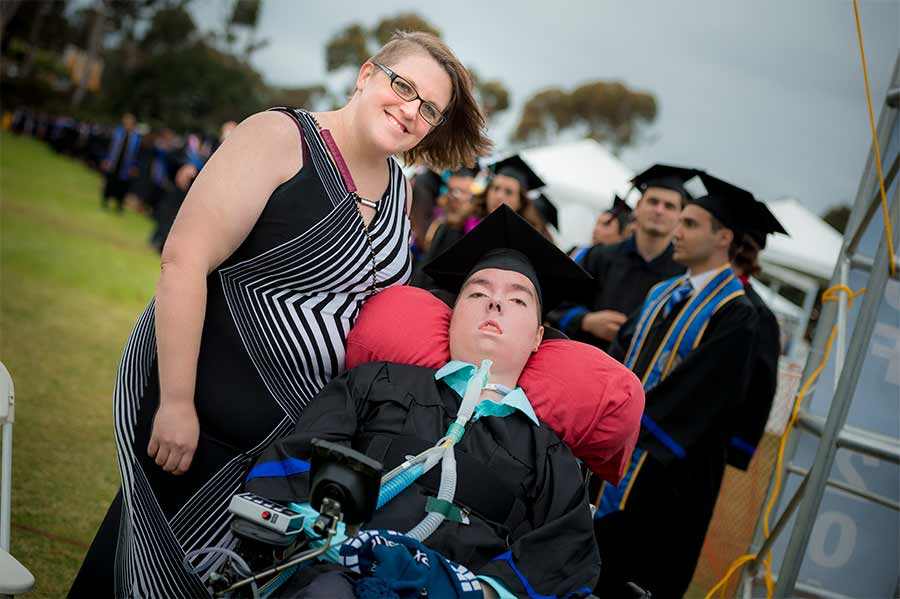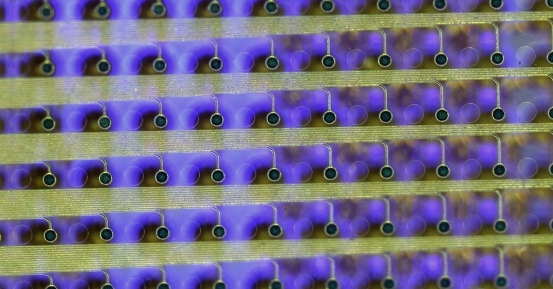
By:
- Christine Clark
Published Date
By:
- Christine Clark
Share This:
Graduating Student with Muscular Dystrophy Shows Incredible Strength to Achieve his Dreams

Raul Carranza at graduation. Photo by Erik Jepsen/UC San Diego Publications
Raul Carranza, who is graduating with a degree in political science from UC San Diego, is not your typical student. The Chula Vista native, who will soon apply to law school and plans to run for public office someday, is passionate about American politics, cares about social justice, studies hard and has a wry sense of humor—but that is not all that sets him apart. Carranza was born with muscular dystrophy and only has limited use of his right thumb. The condition has impaired his ability to move his limbs, breathe on his own, swallow and even blink; however, that has not deterred him from pursuing and achieving his goals, even if it meant he would have to overcome one obstacle after another.
When Carranza was 14, he had a tracheotomy that replaced a breathing apparatus that covered his face. Today, he has the ability to speak at a very low volume; most of the time, a nurse or caretaker must help translate for him.
Carranza was diagnosed with muscular dystrophy, a disease that causes progressive weakness and loss of muscle mass, when he was 2 years old. He was given an electric wheelchair at age 3. “I was so young to be operating such a machine that doctors made me take driving lessons before taking the wheelchair home,” he said with assistance from his caretaker.
Today, Carranza, one of UC San Diego’s class of 2016 outstanding grads, uses a palm-sized USB touchpad to operate his computer with his right thumb. With this device, he writes essays, takes tests and often communicates with the world through social media and blogs.
In one blog post, he wrote: “I’ve faced many obstacles in life. Obstacles that most normal people couldn’t even imagine. Sometimes I get discouraged or depressed. Then I realize life is a series of obstacles. It’s not supposed to be easy. It is how you deal with these obstacles that define you as a person.”
Since attending UC San Diego, Carranza has been supported by the campus’s Office for Students with Disabilities, which serves as a resource to both students with disabilities and the UC San Diego faculty and staff who are providing accommodations to such students in classrooms and labs across campus. The office provides transportation to classes and arranges for assistants to take notes, though Carranza admits he rarely uses them as his sharp memory is his best tool.
By the end of high school, Carranza had lost his ability to walk and breathe on his own; he also had very limited use of his arms, but that didn’t stop him from pursuing higher education. He attended Southwestern Community College and transferred to the UCLA in fall of 2010. He was forced to withdraw after one quarter, however, because of state budget cuts to Medi-Cal that reduced his services, including round-the-clock nursing care that he needs to go to school. The cuts came as a huge blow to Carranza, but his tenacious spirit propelled him to become an activist, not just for himself, but for the thousands of other Californians who were also impacted by the cuts. “I helped organize demonstrations and protests during this time,” he said.
He even took the case to court. After a three-year battle, the state ruled that his needs met the criteria for the acute level of care, which meant he would again be eligible to receive 24-hour care. As such, he enrolled at UC San Diego in fall of 2014.
Carranza’s own health care battles have instilled a sense of social justice in the Thurgood Marshall College student. Rather than celebrate his victory in court, Carranza wrote in a blog post in 2013 that “while this is a great result for me, it does nothing for anyone else. Countless others will have to go through the same thing and they might not be as lucky as I was. They might not have awesome friends and family or great lawyers. Yes I won, but nothing has changed. I still want to change something.”
Carranza’s perseverance is undeniable and when asked what advice he has for students who may be struggling to graduate, the 27-year-old said, “Be uncomfortable. Force yourself. Put yourself in a situation that you’ve never been in before and learn how to overcome the fear. When you stay in a bubble the whole time, you won’t get the most out of the experience.”
Since enrolling at UC San Diego, he has been living on campus in the transfer student housing community the Village at Torrey Pines, as he has taken courses year-round through summer session.
As a political science major with an emphasis in American Politics, Carranza has immersed himself in studies at UC San Diego. He has taken three classes with Nathan Fletcher, UC San Diego’s first “Professor of Practice” in the Department of Political Science.
Fletcher, a veteran of the U.S. Marine Corps and a former California State Assemblyman, is impressed with Carranza’s dedication, intelligence and tenacious spirit.
“I am a big fan of Raul,” Fletcher said. “He did very well in my classes. He always sat in the front and asked questions, and even came to office hours.”
Fletcher said Carranza took all three courses that he teaches at UC San Diego. Notified in advance that there would be a student with special needs in his class, Fletcher said he was immediately impressed with Carranza’s determination.
“At first I thought, this is nice that we are going to accommodate him, but it was a really eye-opening experience,” Fletcher said. “Raul may communicate in a different way, how he gets to the class is different, but there is no limitation to what he can do… He never had any excuses. It was clear he was saying, ‘I am a student. I am here to learn. I am smart.’ ”
Fletcher said Carranza was an active participant in the class, who asked questions and sometimes discussed his views at length on certain issues.
“I would joke with him and say, ‘Raul, I don’t think that was a question, that was a Raul position,’” Fletcher said. “But he always had strong and well-informed opinions.”
Fletcher added, “It wasn’t just me that benefited from having him there; it was the entire class. He was a terrific student and truly inspiring. I wish others had the opportunity to be in a class with him. He has a profound impact on how others with disabilities will be viewed….He makes us all want to do better.”
Carranza got an A in Fletcher’s difficult class on the Voting Rights Act, but he was not happy.
“I got a very long e-mail from him about why it should have been an A plus,” Fletcher said. “I just think that is Raul, case-in-point. He is not content to be in college; he wants to be at the best college. He is not content just to be in class; he wants an A plus. It just shows the determination and grit with which he faces life. That underlying tenacity is deep and strong with him and it will take him far in life.”
Another of Carranza’s political science professors, Mattheus Stephens, had similar words of praise.
“I have never seen a student with more desire to learn,” Stephens said. “He came to every class even though it was challenging for him to do so. He is very bright and is a great role model for other students, especially when you consider the obstacles he has had to overcome. I wish all of my students had the same desire to learn as he does.”
Carranza plans to attend law school after graduation and will apply to schools such as Pepperdine, UCLA and Loyola Marymount.
“I am so proud of him for wanting to pursue law school; he certainly has the intellectual capacity to do it,” added Stephens, who also practices law.
Carranza recently completed the LSAT test, but unlike most students, he doesn’t just have to worry about studying for the test. He also has to ensure he is allowed to have a nurse with him during the test and that the room has electrical outlets to power his wheelchair and assisted breathing device—a process that can be daunting.
Carranza’s aspirations don’t end at law school either. He said his ultimate goal is to run for public office someday. “I know what it is like to struggle,” Carranza said. “I want to make things a little bit easier for people with disabilities and people without them.”
Fletcher said he believes Carranza could be elected to Congress someday. “I certainly would not want to run against him,” Fletcher said. “I had to debate him in class.”
Share This:
You May Also Like
Stay in the Know
Keep up with all the latest from UC San Diego. Subscribe to the newsletter today.


